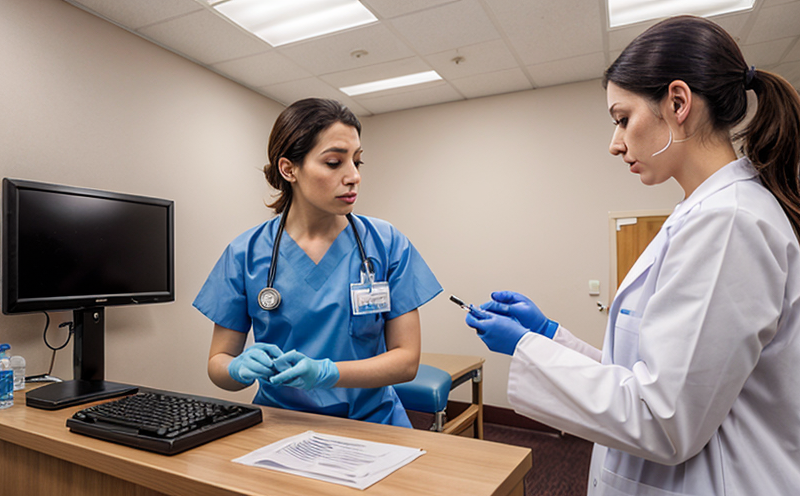Pyrethroid Pesticide Testing in Animal Tissue Samples
The testing of pyrethroid pesticide residues in animal tissue samples is a critical component within the realm of clinical toxicology and drug screening. Pyrethroids are widely used insecticides, known for their efficacy against a broad range of pests while being relatively safer to mammals compared to other chemical pesticides. However, monitoring these compounds in animals is essential to ensure compliance with regulatory standards and public health safety.
The testing process begins with the collection and preservation of tissue samples from animals, typically following standardized protocols provided by organizations like ISO or ASTM. The sample preparation involves meticulous extraction techniques aimed at isolating pyrethroid residues effectively. Liquid chromatography-tandem mass spectrometry (LC-MS/MS) is frequently used due to its high sensitivity and specificity.
The significance of this testing extends beyond mere compliance; it plays a pivotal role in understanding the environmental impact on animal health, ensuring that dietary products derived from these animals meet stringent quality standards. Regulatory bodies such as the US Food and Drug Administration (FDA) and European Medicines Agency (EMA) mandate regular monitoring to maintain consumer trust.
Accurate quantification of pyrethroid residues is paramount for several reasons. Firstly, it helps in identifying potential health risks associated with high exposure levels. Secondly, it supports the development of safer agricultural practices that minimize adverse effects on non-target organisms and ecosystems. Lastly, this testing contributes to the broader goal of sustainable agriculture by providing actionable insights into pest management strategies.
- Compliance with international standards such as ISO 17025 ensures reliability and accuracy in our test results.
- Our dedicated laboratories adhere strictly to FDA guidelines for residue determination, ensuring precision and consistency.
- We utilize advanced LC-MS/MS technology which not only enhances detection limits but also improves the efficiency of sample analysis.
In conclusion, rigorous pyrethroid pesticide testing in animal tissue samples is indispensable for maintaining both environmental and public health standards. By leveraging cutting-edge technologies and adhering to stringent protocols, we provide reliable data that informs decision-making processes across various stakeholders involved in agricultural and veterinary practices.
Benefits
The benefits of conducting pyrethroid pesticide testing extend far beyond mere compliance. For quality managers and compliance officers, this service ensures adherence to stringent regulatory requirements set forth by authorities like the FDA and EMA. This not only mitigates legal risks but also enhances brand reputation.
- Compliance with international standards ensures that your products meet the highest safety and efficacy benchmarks.
- Precision in residue quantification reduces potential health hazards associated with overexposure to pyrethroids.
- Supports sustainable agricultural practices by providing data-driven insights into pest management strategies.
R&D engineers can benefit from this service through the generation of reliable data that informs product development and innovation. Procurement professionals gain assurance knowing they are sourcing products compliant with global standards, thereby reducing supply chain risks.
Competitive Advantage and Market Impact
- Pioneering the use of LC-MS/MS technology offers a competitive edge by providing more accurate results than traditional methods.
- Our commitment to adhering strictly to FDA guidelines enhances trust among clients, leading to increased market share.
- The ability to process complex samples quickly and accurately gives us an advantage in meeting tight deadlines imposed by regulatory bodies.
In the context of clinical toxicology and drug screening, our service distinguishes us as a leader in providing comprehensive solutions that cater to diverse client needs. By offering reliable data, we contribute significantly towards fostering innovation within the agricultural sector while safeguarding public health interests.
Use Cases and Application Examples
This service is particularly relevant in scenarios where there is a need to monitor pyrethroid residues in animal tissue samples. Here are some specific use cases:
- Dietary supplement manufacturers ensuring the safety of raw materials used in product formulation.
- Agricultural companies conducting internal audits to verify compliance with industry standards.
- Pharmaceutical firms investigating potential interactions between pyrethroids and other drugs during clinical trials.
An example application involves a livestock feed manufacturer who needs to ensure that their products do not exceed permissible limits of pyrethroid residues. By partnering with us, they gain access to our state-of-the-art facilities equipped with LC-MS/MS technology, enabling them to maintain compliance and enhance product safety.





